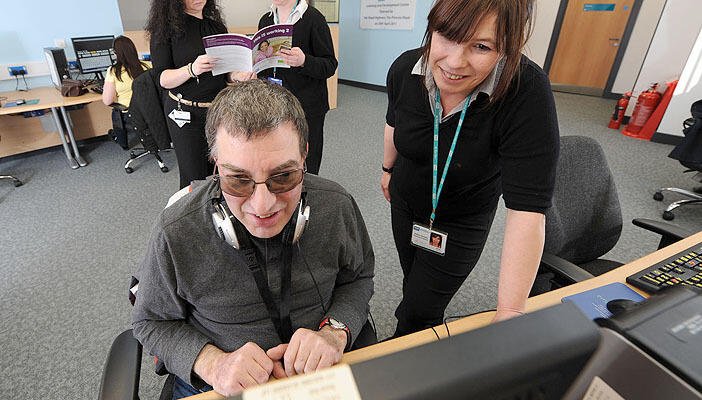Four changes to Access to Work which will help blind and partially sighted claimants
Following our campaigning, the Department for Work and Pensions (DWP) has confirmed changes to make the claims process more accessible for blind and partially sighted people.

The Government’s Access to Work scheme provides practical support and advice to disabled people and employers to help overcome work-related obstacles for people with disabilities. This can include meeting the cost of specialist equipment, adaptations or support workers. It can also help with travel to and from work.
The DWP recently confirmed four “reasonable adjustments” that can be requested when making a claim through Access to Work. This follows our campaigning for the claims process to be made more accessible.
Obstacles to submitting an Access to Work claim
Despite the scheme’s importance, we have heard from countless blind and partially sighted people about the inaccessibility of claiming Access to Work support, including the difficulty of accessing and independently completing and signing standard print forms.
RNIB campaign success
This month we achieved an important campaign win as the DWP confirmed four reasonable adjustments customers can request. These are an important step forward in our campaign for fair and equal access to benefits and employment for blind and partially sighted people:
1. Easements introduced during the pandemic remain in place
Following the outbreak of COVID-19, easements to Access to Work were introduced. These include accepting email claim forms as a reasonable adjustment, and employer and support worker signatures via email. Worryingly, we heard several customers had been informed that the easements were coming to an end, but the DWP has now confirmed all easements introduced during the pandemic remain in place, with no planned date to end them.
2. Email as a reasonable adjustment remains in place
To receive Access to Work funding, customers submit a claim form. The DWP has verified that Access to Work offers email as a reasonable adjustment for customers that find completing and posting a paper-based claim form inaccessible. This adjustment is separate to the easements introduced during the pandemic.
3. Editable electronic form can be requested
Revised electronic forms for claiming Access to Work were also introduced in June. These are available for anyone requesting an accessible format.
4. Email signatures are accepted as a reasonable adjustment
For years we have been calling for Access to Work to accept electronic signatures, highlighting that for many people with sight loss providing a wet signature can be extremely challenging without sighted support.
We are pleased the DWP has confirmed that email signatures will be accepted as a reasonable adjustment for customers to sign off a claim request, where email as a reasonable adjustment is agreed upon.
The DWP has also verified that the revised electronic claim forms allow customers to type their name, and this will also be accepted instead of a wet signature, where email as a reasonable adjustment is in place.
How to request an adjustment
If you would like to request any of the adjustments listed above, you can do so by speaking to your Access to Work adviser.
If you experience any problem obtaining the adjustment, please get in touch with us at [email protected].
Find out more about our campaign on employment.







